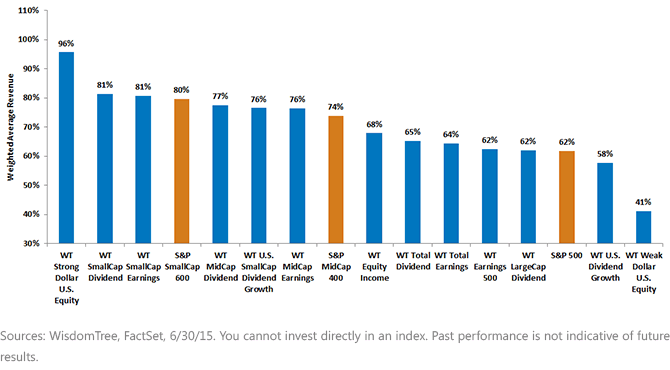How U.S. Economy Centric Is Your U.S. Equity Exposure?


 • WisdomTree Strong Dollar U.S. Equity Index – generated the highest percentage of revenue from within the U.S. This Index includes only firms that derive more than 80% of their revenues from within the United States. These companies tend to be less impacted by a strong-dollar environment—they aren’t focused on selling their goods and services abroad, and their import costs decrease with a rising purchasing power of the dollar. The Index also tilts weight more heavily toward stocks whose returns have a higher correlation to the returns of the U.S. dollar.
• Small- and Mid-Cap Indexes – typically generate a higher percentage of their revenues from their domestic economies than do large-cap indexes. Another way to potentially steer around the negative earnings impact from a strong dollar would be to focus on small- and mid-cap companies, which tend to be less reliant on exports to drive revenue.
• WisdomTree Weak Dollar U.S. Equity Index – generated the lowest percentage of revenue from within the U.S. This Index includes only firms that derive at least 40% of their revenues from exports. These firms tend to be more impacted by a strong-dollar environment, as they are focused on selling their goods and services abroad. Similarly, during a weak-dollar period, we’d expect these firms to become more competitive in selling their goods abroad. The Index also tilts weight to stocks whose returns that are more negatively correlated (or have a lower correlation) to the returns of the U.S. dollar.
What Are Your Thoughts on the Dollar?
Among the most important macroeconomic forces impacting the market have been currency changes motivated by diverging monetary policies. If you believe the U.S. dollar will continue to strengthen over the coming years, as is WisdomTree’s baseline view, this can provide continued headwind to U.S. exporters. In response, we think it makes sense to favor the WisdomTree Strong Dollar U.S. Equity Index or indexes focused on mid- and small-cap companies.
Conversely, if you believe the U.S. dollar trend is set to reverse, such an environment would favor U.S. exporters and the WisdomTree Weak Dollar U.S. Equity Index.
1Procter & Gamble Q4 2015 Earnings Call Transcript, 7/30/15.
• WisdomTree Strong Dollar U.S. Equity Index – generated the highest percentage of revenue from within the U.S. This Index includes only firms that derive more than 80% of their revenues from within the United States. These companies tend to be less impacted by a strong-dollar environment—they aren’t focused on selling their goods and services abroad, and their import costs decrease with a rising purchasing power of the dollar. The Index also tilts weight more heavily toward stocks whose returns have a higher correlation to the returns of the U.S. dollar.
• Small- and Mid-Cap Indexes – typically generate a higher percentage of their revenues from their domestic economies than do large-cap indexes. Another way to potentially steer around the negative earnings impact from a strong dollar would be to focus on small- and mid-cap companies, which tend to be less reliant on exports to drive revenue.
• WisdomTree Weak Dollar U.S. Equity Index – generated the lowest percentage of revenue from within the U.S. This Index includes only firms that derive at least 40% of their revenues from exports. These firms tend to be more impacted by a strong-dollar environment, as they are focused on selling their goods and services abroad. Similarly, during a weak-dollar period, we’d expect these firms to become more competitive in selling their goods abroad. The Index also tilts weight to stocks whose returns that are more negatively correlated (or have a lower correlation) to the returns of the U.S. dollar.
What Are Your Thoughts on the Dollar?
Among the most important macroeconomic forces impacting the market have been currency changes motivated by diverging monetary policies. If you believe the U.S. dollar will continue to strengthen over the coming years, as is WisdomTree’s baseline view, this can provide continued headwind to U.S. exporters. In response, we think it makes sense to favor the WisdomTree Strong Dollar U.S. Equity Index or indexes focused on mid- and small-cap companies.
Conversely, if you believe the U.S. dollar trend is set to reverse, such an environment would favor U.S. exporters and the WisdomTree Weak Dollar U.S. Equity Index.
1Procter & Gamble Q4 2015 Earnings Call Transcript, 7/30/15.

Jeremy Schwartz has served as our Global Chief Investment Officer since November 2021 and leads WisdomTree’s investment strategy team in the construction of WisdomTree’s equity Indexes, quantitative active strategies and multi-asset Model Portfolios. Jeremy joined WisdomTree in May 2005 as a Senior Analyst, adding Deputy Director of Research to his responsibilities in February 2007. He served as Director of Research from October 2008 to October 2018 and as Global Head of Research from November 2018 to November 2021. Before joining WisdomTree, he was a head research assistant for Professor Jeremy Siegel and, in 2022, became his co-author on the sixth edition of the book Stocks for the Long Run. Jeremy is also co-author of the Financial Analysts Journal paper “What Happened to the Original Stocks in the S&P 500?” He received his B.S. in economics from The Wharton School of the University of Pennsylvania and hosts the Wharton Business Radio program Behind the Markets on SiriusXM 132. Jeremy is a member of the CFA Society of Philadelphia.

